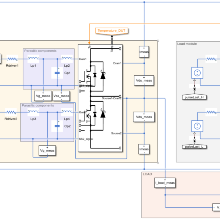Digitaler Zwilling & KI-basierte Regelung
SiC MOSFETs have emerged as a promising solution for high-power applications. However, their long-term reliability can be compromised when subjected to temperature fluctuations, which are common in many real-world operating environments. Rapid temperature cycling can induce degradation in these devices both at the semiconductor level (e.g. deep traps, interfacial stress, oxide failure, etc.) and the package level (e.g. cracks, delamination, bond-wire lift-off, etc.). This result into non-ideal behaviour in the electrical (e.g. RON, VTH, IGSS, RDSS, etc.) and thermal characteristics (e.g. RTH) of the device. As a result, it is important to tackle the temperature-induced degradation and thus increase the lifetime of the SiC MOSFETs.
This work primarily focuses on implementing an efficient thermal management system based on a predictive temperature controller and smoothing algorithm to reduce the magnitude of temperature fluctuations and thus extend the SiC MOSFET module lifespan to be used in a 3-phase inverter (B6 bridge topology).
Tasks and Goals:
- Familiarization and state-of-the-art literature research for
- different temperature sensitive electrical parameters (TSEPs) for SiC MOSFETs.
- temperature control systems
- Determination of the setpoint MOSFET junction temperature (TJ,SP) from a given predicted temperature fluctuation profile, based on different target variables, such as range, service life, robustness and energy efficiency.
- MATLAB/Simulink-based implementation of the temperature controller, which translates the TJ,SP value into the appropriate SiC MOSFET TSEPs and other inverter parameters (e.g. dead-time, switching frequency, etc.) and thus regulate the actual junction temperature of the MOSFET (TJ,actual) .
- Experimental verification and evaluation of the temperature and smoothing control.
- Written thesis and presentation.
ExpectedQualifications:
- Experience of MATLAB and Simulink.
- Knowledge of B6-bridge inverter topology.
Optional (Preferable) Qualifications:
- Attended the Robust Power Semiconductor Systems I & II courses offered by our institute.
- Experience with dSPACE equipments.
Start: Immediately
Beschreibung:
Als HIWI sind Sie für verschiedene Aufgaben im Zusammenhang mit der Entwicklung von unterstützenden Schaltungen für Wechselrichter mit Halbbrücken-, Vollbrücken- und B6-Topologien zuständig.
Verantwortlichkeiten:
• Entwurf von Leiterplatten für Wechselrichterschaltungen, z. B. Gate-Treiber-Leiterplatten für Halbbrücken-, Vollbrücken- und B6-Wechselrichter.
• Löten von SMD- und Through-Hole-Komponenten auf Leiterplatten.
• Durchführen von Tests an den entwickelten Schaltungen.
Erforderliche Qualifikationen:
• Erfahrung in der Entwicklung von Schaltungen.
• Erfahrung im Entwurf von (Hochspannungs-) Leiterplatten mit z.B. Altium-Software.
• Kenntnisse im Löten von PCBs.
• Fähigkeit zur Durchführung von Spannungs- und Strommessungen an einem Hochspannungsaufbau.
Optionale/bevorzugte Qualifikationen:
• Erfahrung im Umgang mit Schablonendruckern, Bestückungsautomaten und Reflow-Öfen zum Löten von Leiterplatten.
• Kenntnisse von Steuerungssystemen im Zusammenhang mit dem Betrieb von Wechselrichtern.
• Erfahrung mit MATLAB und Simulink.
HIWI Vertragsinformationen:
• 40 Stunden pro Monat
Kontakt

Oleksandr Solomakha
Dr.
Swapnil Sunil Roge
M.Sc.Wissenschaftlicher Mitarbeiter


